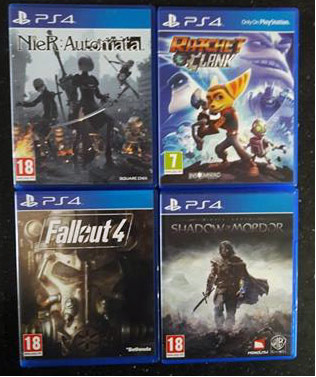
by John | Dec 6, 2019 | Writing Insights
The importance of world-building – in all genres, although particularly science-fiction, fantasy, and horror – can’t be understated. The world of your script isn’t something that should be designed separately from the story, but in tandem with it.
(more…)

by John | Nov 9, 2018 | Writing Insights
Video games are a massive market for writers to explore: the recent RED DEAD REDEMPTION 2 made £725 million in its first weekend and shipped 17 million copies in two weeks – the largest opening weekend in the history of entertainment! If you want to get into this market as a writer, this article is for you…
Video games might be lucrative, but it’s not always easy to figure out all the terminology means. If you don’t know the difference between an FPS and an RPG, or an emote and a cutscene… Well, you certainly wouldn’t be the first!
That’s why Mark Brendan, our Elite Consultant for video game writing, is here to help. Mark has put together a handy guide for anyone who wants to get involved in writing for this new medium that cuts through the confusion and explains what all the terminology means…
Game Genre Terminology
RTS = Real-time Strategy
Normally top down view, often wargaming, but could be running a power station or theme park. Involves managing resources in real time to achieve a goal.
Command and Conquer, Total War series
FPS = First Person Shooter
An extremely popular style of game where the perspective is first person, as if through the eyes of the ingame character. Sometimes nothing of the character is visible, on other occasions hands with weapons are visible and the player can see some of their body when they look down, or press to interact with ingame objects. Shooter refers to the style of the game play – the gaminig is predominantly fighting with ranged weaponry.
Call of Duty, Bioshock, Half-Life
RPG = Role-playing Game
While the FPS is predominantly concerned with fast-paced action, an RPG takes longer to unfold. There are likely to be action sequences, often combat, sometimes challenges such as climbing. The player will gnerally be required to have much more of a relationship with the ingame world than in an FPS. To advance the player will need to talk to NPCs (Non-Player Characters), find and use objects, and solve puzzles to advance. While an FPS often makes the main character invisible, most modern RPGs allow extensive modification of the player’s character to customize it to their own preferences.
Fallout 3, Oblivion, Mass Effect
Third Person
In a third person game the player can see the character they are playing onscreen. The action is viewed as if from behind the character’s shoulder.
Prince of Persia, Uncharted, Tomb Raider
MMO – Massively Multiplayer Online
An online game that involves many people accessing the same game world at the same time.
World of Warcraft, Guild Wars
Narrative Terms
Cutscene
A cutscene is a non-interactive section of a game. This is generally used to tell story and to set up the key gameplay points for the next level i.e. Get to that bridge!
Scripted Event
A scripted event is an interactive cutscene. Here the player retains control while an event they don’t control such as a building collapsing, a plane flying by, or someone appearing on a balcony takes place.
Ingame/Level dialogue/Barks
This is dialogue that happens during the interactive sequences. The player will retain control as they hear pedestrians talking as they walk by, enemy soldiers calling orders, or companions calling warnings.
Emotes
Emotes are sounds rather than words such as a scream, a grunt, the effort sound of lifting; these are emotes rather than lines.
Player Activated Dialogue
Dialogue which the player triggers themselves by pressing to interact with characters in the game.
Ingame Terms
Player Character
As the title infers, this is the character the player controls. There can be numerous player characters in the game and the ‘character’ can lack many of the key things that define a character in other fiction (backstory, personality, etc.)
NPC = Non-Player Character
A non-player character is one that the player does not control. They could be an enemy, an ally, or neutral in terms of their approach to the player character.
With any luck, you’ve now got a better grasp of the gaming terminology a writer needs. If you really want to take your writing to the next level, we’d recommend get Elite Mentoring from Mark Brendan himself!
Take a look at Jamie White’s thoughts on writing for video games too in this article, where there are plenty more hints and tips to be found!
This is a great time to be getting involved in writing for video games; WriteMovies is still looking for scripts for both films and games to be directed by 2x BAFTA winner and 2x Oscar nominee Habib Zargarpour, too, which can be submitted to our Winter 2019 Contest.

by John | Jul 16, 2018 | Our Winners, Updates
We recently announced the winning script in this brand new category: BIG BALLS aka FUTUREBALL by Richard Guimond!
A big congratulations to Richard for being the very first winner of Best Video Game Script – he now receives a copy of our Confidential Studio Manual and exclusive previews of our Virtual Film School.
Read on to find out about the winning script: BIG BALLS aka FUTUREBALL!
Here’s Richard’s summary of his script…
“A Whole New Ballgame: A 21st Century sport, utilizing an incredible history-making vehicle. A classic underdog, Rocky-themed script that levels the playing field for men, women, and teenagers. Will the Reynolds family bring this revolutionary new sport to fruition? With big business stealing their Futureball concept away from them, this script charts their battle with this business entity, as well as their family adventures and comical mis-adventures in launching this new sport of man and machine.”

And a short biography of Richard too…
“I am a former deep sea fisherman, and award winning screenwriter and novelist. I have won over thirty-five awards including but not limited to from Grand Prize, Gold, Silver, and Finalist for many of my screenplay works in adult fiction. Over the last few years, I have won seven Finalist Awards and a Special Jury Award from The West Field Screenplay Competition for METACOMET. I also won First Place in The Kids First Media Competition at the Santa Fe Film Festival for my Family PG Screenplay titled: FUTUREBALL aka BIG BALLS, which now has won WriteMovies competition in their Video Game category.
I began my fishing and writing career at an early age. I started with a small skiff which eventually grew into a fleet of one hundred foot vessels, engaged in the trapping of offshore lobsters on the virgin Continental Shelf. At the time, I was the youngest fisherman in New England to venture out into this no-man’s land of risky, profitable opportunity. On the high seas, I did battle with competitive fishing fleets, stormy weather, winter nor’easters and cranky crews. Some of my novels and screenplays have captured some of those incredible adventures. I have written Fifteen Screenplays, Six Novels, and a Stage Play.”
If you’ve got a great idea for a video game script, check out our Elite Mentoring service. Mark Brendan, our Video Games and Board Games Elite Mentor, can give you valuable advice that will help you develop your script to its maximum potential.
Take a look at Mark’s profile here!

by WriteMovies | Jul 7, 2018 | Our Winners, Updates
 We’re really pleased to announce the first winner from our Spring 2018 Contest – and the first winner for our newest category, the Best Video Game Script! Video games are a huge and growing market, and often cost as much as the biggest movies to make. Their scope and scriptwriting are often as intricate as the best movie scripts, and on a much bigger scale. We wanted to offer a new prize for video game scripts to reward writers who can see the potential of that market for writers and who can stake a claim to it. (more…)
We’re really pleased to announce the first winner from our Spring 2018 Contest – and the first winner for our newest category, the Best Video Game Script! Video games are a huge and growing market, and often cost as much as the biggest movies to make. Their scope and scriptwriting are often as intricate as the best movie scripts, and on a much bigger scale. We wanted to offer a new prize for video game scripts to reward writers who can see the potential of that market for writers and who can stake a claim to it. (more…)

by John | May 11, 2018 | Competition Offers, Highlights, Updates, WMC, WriteMovies News
We’re looking for a script for a two-time Academy nominee and two-time BAFTA award-winning director – and submitting your VFX-driven script to our Spring contest can make it yours! Habib Zargarpour has worked with Spielberg, Lucas, Cameron and Villeneuve, on movies that countless millions of people have seen – and soon your script could join them. We’re looking for a great commercial script for him to work with, and if you submit to our Spring 2018 contest, you will be in the running for that opportunity.
As we’ll tell you very soon, Habib and our founder Alex have been getting a lot of success in recent meetings with senior Hollywood execs about their next crossover project, and yours could be next! We’ve introduced many new categories to the Spring 2018 – long and short form TV pilots, indie and studio scripts, and video game scripts. Inspired by this opportunity, we will be giving a special recognition to the Best VFX Driven Script that we receive. There’s no special prize – just kudos – but if Habib loves it then we CAN make this happen.

Award-winning VFX expert Habib Zargarpour
What we want is the script where VFX can help drive the plot, the characters, and the script as a whole. We don’t want style over substance, we want style to give substance! We’re looking for a VFX-driven script with crossover potential to make an awesome video game. The director of this project, Habib Zargarpour (find out more about him in THESE past interviews, and in more articles we’ll publish soon!) has been VFX consultant on lots of major movies and major video games including 007 and NEED FOR SPEED titles – so we have the potential to take this to both markets, which is exactly what Habib and Alex have been doing for another project in Hollywood in the last few days – as we’ll be telling you next week!
So polish up that movie script you thought would be too expensive for anyone to make, and get it to us NOW!
Enter HERE!

by John | Apr 13, 2018 | Writing Insights
Jamie White continues his thoughts on writing for video games. This time it’s all about the difficulties of writing open world games…
 Up until now the games I’ve talked about have had a very linear narrative structure. The gamer doesn’t really have that much control of where the character goes or what they can do. That’s all about to change as we look into what is possibly my favorite genre of game – open world sandbox RPGs.
Up until now the games I’ve talked about have had a very linear narrative structure. The gamer doesn’t really have that much control of where the character goes or what they can do. That’s all about to change as we look into what is possibly my favorite genre of game – open world sandbox RPGs.
OK, it can be a bit of a mouthful, but these types of games (which I’ll just refer to as sandbox games) are usually the most immersive. They offer the player a variety of options within an open world setting – you can create your own character from scratch sometimes, mix and match weapons, and perhaps most importantly, nail your outfit. That might sound kinda silly, but giving the player that little bit of control allows them to put some of their personality into the character.
So why are they called sandbox games? Well, as always, Wikipedia puts it best…
“A game in which the player has been freed from traditional video game structure and direction, and instead chooses what, when, and how they want to approach the available content. The term alludes to a child’s sandbox without rules, with play based on open-ended choice. While some sandbox games may include building and creative activities, they are not required. Sandbox games generally employ an open world setting to facilitate the player’s freedom of choice.” – https://en.wikipedia.org/wiki/Glossary_of_video_game_terms#osandboxgames
So, in short, you can do whatever you like with sandbox games – as long as you stay inside the sandbox and only use the sand and really cool customizable plastic shovels.

A collection of various sandbox games.
I also mostly find that these games have some of the best storylines. Whether it’s the more recent Horizon: Zero Dawn or Nier: Automata, or classics of years gone by like Red Dead Redemption or GTA: San Andreas. The big issue for writers when writing for these types of games, though, is side quests.
Think of side quest as sub-plots. Some are more related to the main plot than others, while some are simply hunting and/or gathering missions. What they should always be, though, is interesting. The escort side mission has become the bane of many gamers’ existence (it’s just so damn annoying!) and finding specific artifacts or plants to complete a quest is just super tedious and unimaginative. These types of missions can add some needed variation to side quests, but finding several unique ways to handle them can be a tough task for writers.
An even tougher task is how the hell you actually write these types of games. And much like the narrative focused games I looked at in my previous article, there isn’t a set way. You gotta go with whatever makes sense to you. But, I do have a suggestion.
Sandbox games are comprised of, essentially, two plot arcs: A) The main story and B) the side quests. Sometimes these side quests only become available after you’ve reached a certain point in the main story, or after you’ve unlocked a certain weapon, or whatever, so how can you writer both into one document?
Well, you’re familiar with those “Choose Your Own Adventure“ novels, right? The ones that say “Turn to page 36 to follow the dragon”, then you turn to page 36, get killed by the dragon and quickly turn back to the previous page. Well, I think you could follow a similar sort of format.
Start out writing the main plot as you would a regular script. Then, when you get to a place where you think “hey, I can add a side quest here”, make a note like “SIDE QUEST “A side quest served cold” now available. Turn to page 124 for narrative”, then carry on with the main plot. You could either then finish the main storyline before adding the side quests, or add them as you go.
Again, it’s best to do it however you feel comfortable. While there’s strict format for screenplays, that is not really the case for video game writing.
 Most importantly, though, especially for new video game writers – stick to writing the main plot. Don’t take the Skyrim route that has several big plotlines and what feels like millions of side quests. It can be exhausting to play, so I can only imagine how it would be to write…
Most importantly, though, especially for new video game writers – stick to writing the main plot. Don’t take the Skyrim route that has several big plotlines and what feels like millions of side quests. It can be exhausting to play, so I can only imagine how it would be to write…
If you wanna write your own video game script and enter it in our Spring Contest (we allow video game scripts now!) but aren’t quite sure on how to approach it, just get in touch! Maybe we can end up doing a Q&A sorta thing…? We’ll see!
I wanna also talk about why you film and TV writers should not look to adapt video games into mainstream consumptive media, but that’s an article for another day…

by John | Apr 4, 2018 | Writing Insights
With the recent arrival of a new Elite Mentor joining the team (one who specializes in video games), Jamie White continues his look at how you can be successful at writing for video games.
 After looking at the linear narrative to the Call of Duty games last time, I thought the next step would naturally be to look at games with an over-arching narrative, but with hundreds, maybe thousands, of variations and combinations.
After looking at the linear narrative to the Call of Duty games last time, I thought the next step would naturally be to look at games with an over-arching narrative, but with hundreds, maybe thousands, of variations and combinations.
For me, the story is almost always more important than gameplay. Of course, there are various examples where it’s the other way around (looking at you Bloodborne) but the story and characters are the most important thing in video games, as they should be for any medium.
And so, that’s why I love TellTale games, Life is Strange and Heavy Rain. These games can be played by any kind of noob, by a child, or even your dog. These types of games mostly rely on you just pressing buttons to choose one of four dialogue options or performing “Quick Time Events”. I’d hesitate to even call them games – more like… interactive movies. And you know what? That’s fine with me.
But these types of games are much more difficult to write than the linear narrative of Call of Duty or the Injustice games. Looking primarily at TellTale, they employ an episodic format for their game releases. So, The Wolf Among Us will have 5 episodes, or their Game of Thrones game will have 6 episodes, which are released every 2-3 months. But the seemingly impossible task comes from the amount of choice you have within these games. Choosing from 4 dialogue options is no exaggeration, and there will be a LOT of conversations throughout the game – sometimes they force you to make a choice (to kill one guy or another, to burn a magical tree or not).
The secret with these type of games, though, is the choices and dialogue options don’t really matter. They give the player the “illusion of choice”. So, you can easily write the basic outline of the plot, then go back in and decide where you want to have multiple dialogue options. Go back and write in a QTE as you would an action scene – but remember, the player can mess these up, so you’ll need at least two outcomes for each action the player does (or fails to do).
Check out this video to the opening of TellTale’s The Wolf Among Us. This is the very first thing the player does. It’s a great intro to both the series, the game, and the game type.
Just a warning there is some violence, swearing, and a talking frog in this video. So, you’ve been warned.
I chose The Wolf Among Us for a couple of reasons. A). I love it. I love the story, the concept, the tone, the themes. It’s brilliant. Go play it, or at the very least, watch the playthroughs. It’s worth it. B). It showcases really well all the elements of a “Branching narrative” game.
Just note how many multiple-choice options there are, how many places the player can actually screw up. Then think about all the potential consequences and outcomes to each different dialogue choice or failed action. There’s a lot, right?
 The best advice I can think to give if you want to write this type of video game is… How would you (as an individual) find it easiest to write this opening scene from The Wolf Among Us? There’s no right answer. You can use Celtx (format it as you would when two people talk at once, then do the same for the replies), or Excel (put each dialogue/action option into a separate cell), Word, a flowchart. Whatever you feel would be the most efficient way to map out multiple dialogue and action options FOR YOU, is the right answer.
The best advice I can think to give if you want to write this type of video game is… How would you (as an individual) find it easiest to write this opening scene from The Wolf Among Us? There’s no right answer. You can use Celtx (format it as you would when two people talk at once, then do the same for the replies), or Excel (put each dialogue/action option into a separate cell), Word, a flowchart. Whatever you feel would be the most efficient way to map out multiple dialogue and action options FOR YOU, is the right answer.
And if you feel a little overawed by this task, take a look at the time of the video linked. It’s just under 2 hours. Almost like a film! The episodic format of these types of games allows you as writers to use episode one as a learning curve. You find out the best way you write this type of game, take a break, then get going on episode two.
Next, I’ll look at open world sandbox games, tell you to stay away from writing things like Skyrim, and why make your own adventure novels could be an inspiration for writing these types of games.













